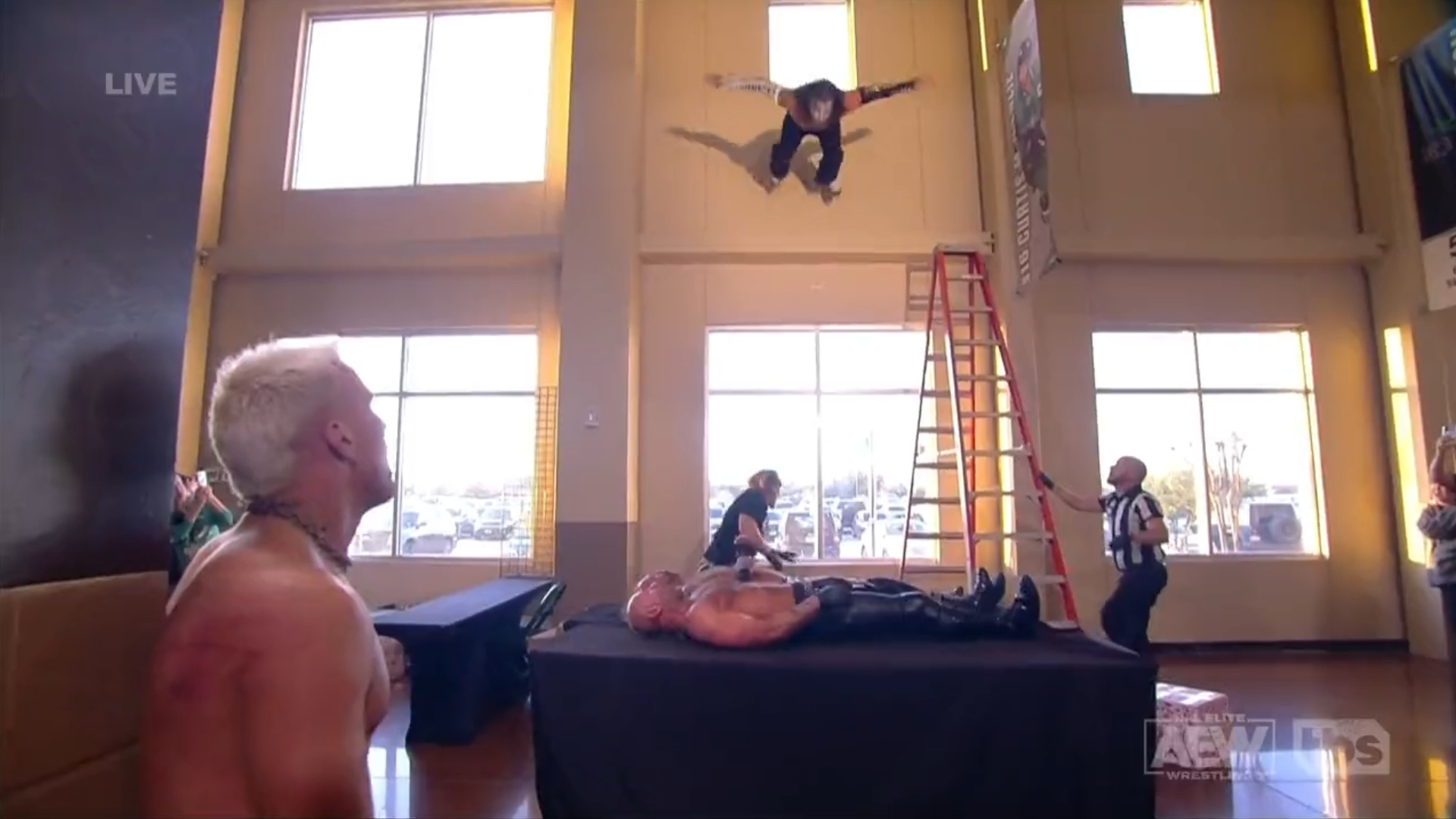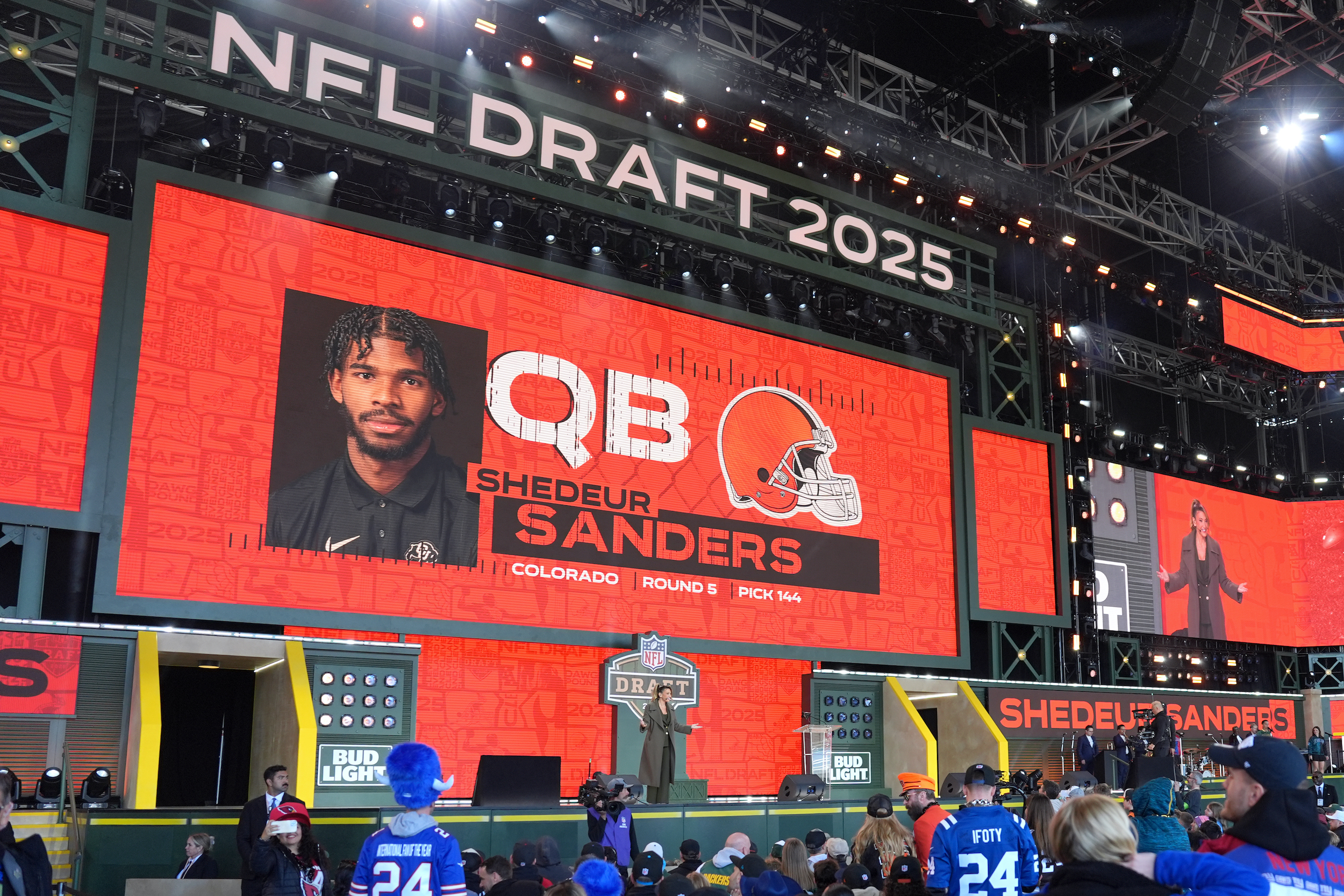When Jeff Hardy was in his prime, he became a gigantic superstar based off his fearlessness, his outcast magnetism, and an aura of indestructibility. Now, at 44 years old, two of those three remain, and while that makes watching Hardy perform a decidedly more anxious experience, the magic he brings to the ring is just as powerful, perhaps even more so, as he begins what might (hopefully?) be his last big run in the business.
A large part of me really believes that Hardy circa 2001 was an apex of masculinity, like James Dean in 1955 or Muhammad Ali in 1974. In his 20s, wrestling in a tag team alongside his older brother Matt and then as a solo star, it's hard to count all the ways Jeff differentiated himself from the rest of the WWF (later WWE) roster as the company enjoyed a peak in mainstream popularity. While so many young wrestlers of today take after Hardy's look and in-ring style, at the time, everything about him stood out in contrast with guys like The Rock and Steve Austin. Hardy was skinny in an age of heavy steroid use, athletic like a soccer player instead of a linebacker, and moving at all times like he had springs in his legs. He presented himself like a Hot Topic employee, dyeing his hair bright colors while wearing nail polish and tight-fitting, sheer, long-sleeved shirts that often came off to loud screams from the crowd in the middle of matches. He made his name through a dogged determination to put his body at risk in novel ways to entertain people, giving him as much in common with the stars of the then-new Jackass as it did his peers.
And threaded through all this ability and idiosyncrasy was the fact that Hardy was beautiful. Whereas an equally beloved self-destructor like Mick Foley wrestled like an underdog dad, powering his way through pain because he wanted to achieve his dream of being a champion, young Jeff Hardy seemed to exist outside those worldly concerns. He was just a gorgeous, thrill-seeking force of nature, and he elevated falling through a table into a work of art.
this is where masculinity peaked imo. it was all downhill from here pic.twitter.com/ASWjtgUH4z
— Lauren Theisen (@theisen95) February 12, 2021
For quite a long time, his sui generis nature disqualified Hardy from being a main eventer, but it also allowed him to build maybe the most devoted and enduring fanbase of his generation—one that's grown larger as Youtube emerged as the best possible medium for distributing and consuming his stunts. It's also, crucially, given Hardy an endless supply of second chances, because Hardy was vulnerable in ways that did not initially come across on television. His struggles with substance abuse made him an unreliable employee and cost him jobs with multiple wrestling promotions. His rock bottom, at least in the public eye, was a 2011 pay-per-view title match with Sting in TNA, where he had to be forcibly pinned in 90 seconds because he was too messed up to perform. But because he was Jeff Hardy, every time he burned a bridge, someone else would be willing to throw him a rope.
Since returning to WWE to a massive ovation alongside Matt at WrestleMania in 2017, Hardy's story has stayed complicated, with an arrest on DWI charges in October 2019 further muddying the easy narrative of recovery and redemption. Professionally, though he enjoyed some vintage moments with the company that first made him a star, Hardy clearly was in a rut by the time fans returned to arenas in the second half of 2021. By this point, WWE saw him as a nostalgia act, and though Hardy was still just as over with the crowds, he was rarely allowed any sustained glory. This two-minute match from a few months ago best exemplifies Hardy's status in the company's hierarchy, as he loses to a bland opponent 20 years younger than him after failing to hit his signature swanton bomb. The simulacrum of that force of nature is present, but not the thing itself.
“With WWE, it just felt like they were keeping me there to sell action figures," Hardy remarked on his brother Matt's podcast last week. "I just felt like a ghost roaming the halls."
This is where it gets a little weird. Hardy just recently became the latest wrestler to jump from the WWE to its upstart rival All Elite Wrestling—reuniting with Matt, who did so two years ago—but his path was stranger than most. At a non-televised WWE event in December, Hardy wandered out of the building in the middle of his tag match for no apparent reason, to the seeming confusion of even his fellow performers. Many who had followed Hardy's career immediately assumed the worst—that he was back to his old "erratic" ways. WWE assumed the same and reportedly demanded that Hardy go to rehab, and fired him when he refused. Hardy and his family, however, say that Jeff is clean, and Jeff later said that his surprise exit was just an exhausted act of rebellion from an unsatisfied performer. And, lucky enough for him, it got him out of that draining situation.
"It was one of the smartest things I've ever done," Jeff said on the podcast.
So to nobody's surprise, Hardy debuted on AEW Dynamite two weeks ago, just as his WWE non-compete expired, accompanied by the same ecstatic cheers that have followed him for over two decades as he did that goofy pelvic thrust dance before going to rescue his brother. Like so many who have defected from the larger company to the smaller, he looked happier and more fulfilled than he had in a long time.
The return of Jeff Hardy to real pro wrestling matches has already brought with it reminders that a seeming immortality can only ever be a gimmick. Matt himself, at 47, seems even more banged up by his years in the ring, and so the athleticism of their newly reformed tag team falls to Jeff, and that makes me more than a little nervous. The struggles he'll face in the faster-paced AEW were already on display in the Hardys' first match last week, when Jeff hit the swanton. In theory, the performer is supposed to lightly somersault through the guy on the ground, but here, Jeff landed with a clumsy thud square on top of an unlucky Isiah Kassidy.
This sold out crowd was READY for the @JEFFHARDYBRAND Swanton Bomb 🔥 #AEWDynamite: #StPatricksDaySlam pic.twitter.com/2sDJ1NIYQ5
— AEW on TV (@AEWonTV) March 17, 2022
He wouldn't be Jeff Hardy, however, if he didn't come back on the next week's show with something even wilder, and that's what he did on Wednesday night. In the concourse of the arena where the Austin Spurs and Texas Stars make their home, Hardy got back on the ladder where he made himself famous, and then he went even higher. It's very stupid. I loved it.
LADDER 🤝 @jeffhardybrand = PERFECTION #AEWDynamite pic.twitter.com/dAe4ZotpeH
— AEW on TV (@AEWonTV) March 24, 2022
I have no idea when anyone is supposed to hang it up in wrestling anymore. So many performers who have suffered "career-ending" injuries—including Edge, Christian, and Bryan Danielson—have since returned to put together great matches with regularity, and at this point it feels almost as normal to see people in their 50s step between the ropes as it does people in their 20s. Jeff Hardy could still conceivably be out there flying through tables a decade from now. I don't think I want that. I hope, that after a run of dream matches and exciting storylines that could serve as the Hardys' crowning achievement, Jeff goes against his nature and walks off into the sunset under his own power, both for his own sake and because, to me, it's the best ending. Jeff Hardy no longer wrestles like an angel sent down from heaven to crash his body through everything he sees. But he's going out like a man who still loves making fans believe that he is.






